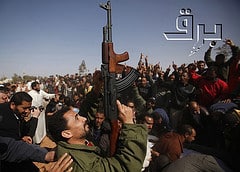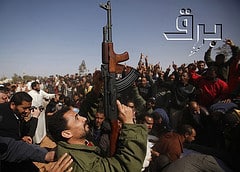Two weeks ago Interpol issued a Red Notice for the Libyan National Army “Saiqa” Special Forces Major, Mahmoud Werfalli.
According to the notice, Werfalli is “wanted by the Judicial Authorities of the International Criminal Court.”
As to the Werfalla case, the Libya National Army (LNA) had twice announced Werfalla’s questioning and arrest, and his subsequent release twice, amid its own ongoing internal investigation.
But the Red Notice muddies a wider, more complicated picture.
First, what is the nature of Libya’s war? To understand go back to June 2014 when Libya held elections for a new parliament, the House of Representatives (HOR). When the results came in, the Islamists, including the Muslim Brotherhood and allied coalition parties who had controlled the previous parliament, called the General National Congress (GNA), realised they had lost big at the polling booth.
Like its neighbours, Egypt and Tunisia, Libyans had largely turned their backs on Islamist ideology and Egypt declared the Brotherhood a terrorist organisation. Many describe the Brotherhood as the mother and father of AQ and ISIS.
As a result, extremist Islamist and allied militias, notably from Misrata, rebelled, organising themselves into Libya Dawn, a coalition that battled seven weeks to secure Tripoli. The elected Parliament House of Representatives (HOR) relocated eastwards, setting up in Tobruk and it turned for help to Khalifa Haftar. Haftar’s Libyan National Army had been battling Islamists, including Ansar al Sharia, the group that killed US ambassador Chris Stevens in Benghazi in 2012, for weeks prior to the elections. Parliament appointed him military commander, a Field Marshall.
His army has since gone from strength to strength. In 2016 it captured the ports and fields of Libya’s Oil Crescent, centre of the country’s oil wealth, ending militia blockades and reopening them to trade, highest oil sales in years. And finally last summer it routed Islamist militants from Benghazi.
Haftar has maintained a hard line stance on how Libya is to be governed. He said there could be no question of militias remaining in control in Tripoli.
That has not gone down well with much of the international community, which wants a peace “coalition” formula to end the civil war. Such a coalition will never happen; its impossible.
The UN is backing the Tripoli Government of National Accord (GNA), which it helped create and chose the appointments, but the GNA has no on-the-ground Libyan support and has instead allied with the militias Haftar is determined to see dissolved.
Hence for many western diplomats, it is imperative that Haftar, hugely popular in the east for ridding it of militants, goes. They will welcome the indicting one of Khalifa’s senior commanders by a seemingly acquiescent Interpol.
But the ICC process is grossly flawed, because it is one-sided. The single worst atrocity one might say in Libya was the slaughter at Brak al-Shatti of 140 LNA recruits, unarmed, after being taken prisoner by Islamist forces allied to the GNA last summer. The GNA announced its defence minister Mahdi Al-Bargathi, commander of those troops, had been suspended.
But the ICC has issued no indictment. Why the double standard?
Such an indictment would pose grave problems for UN support for the GNA if it failed to hand over Bargathi and those troops who carried out that Brak al-Shatti massacre.
Practically, it would make it politically impossible for the U.N. to continue to support the GNA. The ICC has not commented about why it did not investigate the Brak al-Shatti massacre and many known Libyan based terrorists, but two things are clear.
The first is that war crimes justice only works when all sides are under inspection. The second is that when war crimes justice is not impartial, the whole project is undermined. This is the ICC’s failure.
As to peace in Libya, this can only be achieved with help of the neighbouring countries and especially from Russia and UAE both of whom are completing their own air bases in East Libya.
The West and its institutions have discredited themselves and lied once too often.
Copyright: Richard Galustian.


